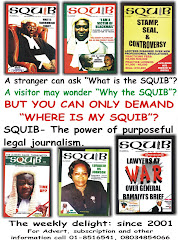THE LEARNED SQUIB
There are many, indeed very many lawyers, at least in Nigeria who are holders of traditional or honorary titles of “Chiefs.” We know of Chief Obafemi Awolowo, Chief Remi Fani-Kayode, Chief Meredith Adisa Akinloye, Otunba (Chief) Adeniran Ogunsanya, Otunba (Chief) T.O.S Benson. All these chiefs are dead now. But there are lawyer-chiefs still very much here with us in the terra firma.
Some of them are Chief G.O.K Ajayi S.A.N, Chief Richard Akinjide S.A.N, Chief Gani Fawehinmi S.A.N, Chief Afe Babalola S.A.N.
Now it is my privilege and joy to announce to you or otherwise bring it to your notice that yours truly has joined the league of titled men, titled lawyers. I suppose you are in some shock. Who could have made a gecko a Chief? Well, wonders they say shall never end; peasants can princes become and paupers Midas. My elevation took place on Thursday 21st February, 2008 in far away Markurdi. Verily I say unto you, the ways of the Lord are mysterious. When with my colleagues, I left our FSP Hotel Imkpi Street, Markurdi that morning for J.S Tarka Foundation, I had no inkling that I would end the day a chief, a high chief for that matter.
Our business at the J.S Tarka Foundation that morning was to attend the National Executive Council Meeting of the Nigerian Bar Association taking place there. Of course, being wise Tigers, my colleagues and I, went to an eatery first and wolved down some large meals. Thus fortified, we sauntered into J.S Tarka.
The meeting was well in progress when we got there or about 9.30a.m. No true gecko sits still in one place for too long. Thus, after about thirty minutes inside the meeting place, I stepped out and into my destiny. I strolled round the J.S Tarka Foundation building, the ground being made more colourful, by the lively tribes of salesmen and women of books and clothes and the ubiquitous occasion photographers. I saw quite a rich display of interesting books and bought one or two. Then I saw a seller of native Tiv caps and clothes. Seeing my interest in the famous black and white stripes cloth he was selling, the seller draped same across my shoulders, put on a cap, made of the same black and white stripes material and lo, I was transformed in a twinkling of an eye into a chief of the Tiv nation. A certain onlooker, an indigene of Markurdi smitten by very authentic looking Tiv posture, pronounced me the Hu-or-O Tiv meaning the friend of the Tiv), there and then.
Apparently the native Tiv regalia fitted me quite well and I was transformed into a celebrity. As I moved about the grounds and the hall, admirers began to number in their scores. Since I looked the (Chiefly) part, I considered it prudent to act the part. I yanked the activist mien from my face, dropped the action walk and the power salutes of the revolutionary.
It was when it got to lunch hour that I temporarily forgot that I was now a prince among men. My first mistake was to join the queue for food with the ordinary commoners. Chiefs don’t do that, they sit in secluded, exclusive places and had their meals, the choicest portions and finest drinks brought to them there. Worse, when I had to have a pick of meals available, I went for, of all things rice, salads and other strange looking herbs and fruits, with stranger non-Nigerian names. Of course for such foods, you don’t use your hands but culinary weapons like knives and forks.
A lady who was dining opposite me complained about my conduct. Said the Gbokoitess, (she’s from nearby Gboko town) “How can you who dress like this (Tiv regalia) dishonour tradition by eating this European food when good, old, solid pounded yam and ‘sweet egusi soup is available?”
Robust as the question was, it didn’t faze me. Emergency chiefs don’t faze easy like that. I put on a brave face and asked her whether she could not see any English suit and bow tie under my Hu-or-O-Tiv chieftaincy wears? When she answered in the positive, I now lectured her on how as an African, I am a man of two worlds - African and European and as such, free to switch from one to the other or mix both.
In the matter of food, I have followed the European path, but on the matter of matrimony, I claimed I will follow the African way, since high chiefs should not be stingy in their allocation of themselves and their resources to just one woman. It was then my dinner-mate’s turn to be uncomfortable. You know the reason why.
Well, I am back to my base in Lagos now and my Hu-or-o Tiv regalia is safely laid in the bottom of my portmanteau. This is not to mean that I should be referred to as an ordinary ‘mister’ again. After all what I tucked away is my regalia and not my title. My title is freely and spontaneously bestowed upon me. I didn’t buy it. I didn’t apply for it. But as for the regalia, all the cardinal pillars of contract, to wit, offer (not mere chaffer) counter-offer, consideration, capacity, intent to create legal relations were present in the transaction. In short I paid for my regalia. I won’t tell you the price. But I will tell you the name of my title again- HU-OR-O TIV!












